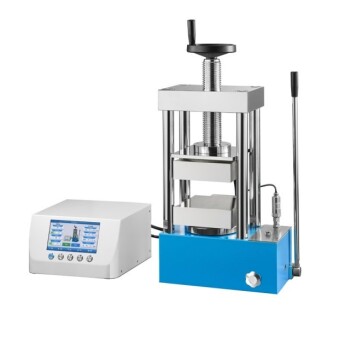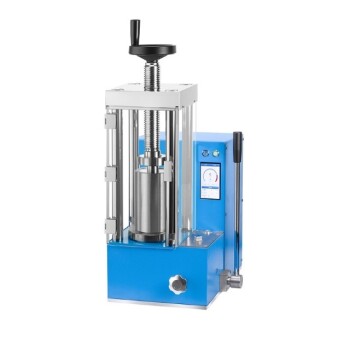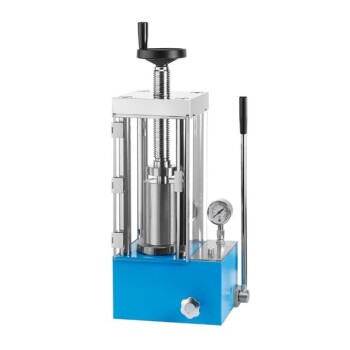At its core, vacuum hot pressing is a material consolidation technique used to create exceptionally dense, high-purity components from powders under heat and pressure. Its key applications range from producing transparent armor and industrial cutting tools to manufacturing critical parts for the aerospace and electronics industries. The process excels in situations where the final material's performance and integrity cannot be compromised.
Many advanced materials fail to reach their theoretical performance because conventional manufacturing leaves behind microscopic voids and impurities. Vacuum hot pressing directly solves this by simultaneously applying high temperature and mechanical pressure in a vacuum, forcing powder particles together to achieve near-total density and superior material properties.
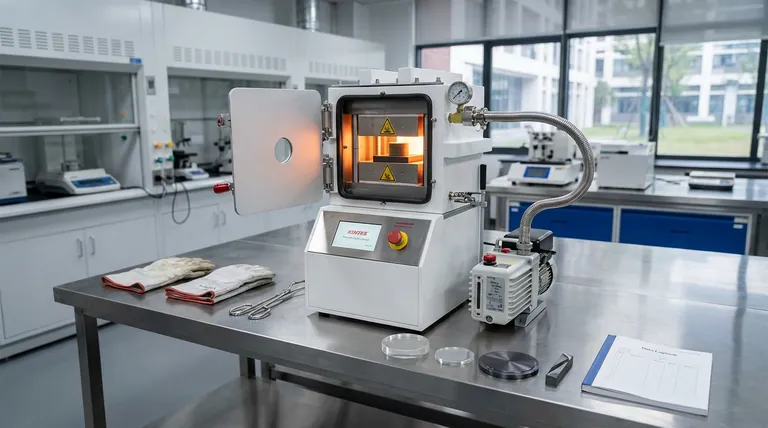
The Core Principle: Overcoming Porosity
Vacuum Hot Pressing (VHP) is not just an incremental improvement over other methods; it is a fundamentally different approach to creating solid materials from powders. The goal is to eliminate porosity—the tiny empty spaces between particles that act as points of failure.
How It Works: Heat and Pressure in Tandem
The process places a powder material into a die, typically made of graphite. This assembly is heated to a high temperature within a vacuum chamber, which softens the powder particles and makes them more plastic. Simultaneously, a powerful hydraulic press applies immense mechanical pressure.
This combination of heat and pressure forces the particles to deform and fuse, squeezing out the voids between them.
The Critical Role of the Vacuum
Performing this process in a vacuum is essential for two reasons. First, it prevents oxidation and other chemical reactions that would occur at high temperatures in the presence of air, ensuring material purity.
Second, it removes trapped gases that would otherwise be stuck within the material, creating internal pores. This is a key advantage over methods that press in a normal atmosphere.
The Result: Near-Theoretical Density and Near-Net Shape
The outcome is a solid component with a density that can exceed 99% of its theoretical maximum. This extreme density directly translates to superior mechanical strength, hardness, and thermal and electrical conductivity.
Furthermore, because the material is formed in a precision die, it often results in a near-net-shape part that requires little to no final machining, saving time and reducing material waste.
Key Application Areas Driven by Performance Needs
The unique capabilities of VHP make it the required process for some of today's most demanding material applications.
Advanced and Transparent Ceramics
For ceramics to be transparent, they must be free of any pores that can scatter light. VHP is the premier method for producing high-purity, fully dense transparent ceramics like spinel and ALON® for optical windows and transparent armor.
It is also used for industrial ceramics like boron carbide and silicon nitride, where maximum density translates directly to extreme hardness and wear resistance for cutting tools and ballistic protection.
Refractory Metals and Superalloys
Materials like tungsten, molybdenum, and other refractory metals have exceptionally high melting points, making them difficult to consolidate via casting. VHP allows them to be sintered into solid forms at temperatures below their melting point.
This is critical for aerospace applications, where these materials are used for rocket nozzles and high-temperature engine components that must maintain their strength under extreme conditions.
High-Performance Powder Metallurgy
While traditional powder metallurgy is common, VHP is employed when standard density is insufficient. Applications include high-performance sintered brake pads and clutches that require excellent wear resistance and thermal stability.
The process also enables the creation of advanced metal matrix composites (MMCs), where ceramic reinforcements are embedded within a metal powder to create a component with customized properties.
Sputtering Targets for Electronics
The manufacturing of semiconductors, flat-panel displays, and solar cells relies on a process called sputtering, which deposits a thin film of material onto a substrate. The quality of this film depends directly on the quality of the source material, known as a sputtering target.
VHP produces sputtering targets that are exceptionally pure and uniform, ensuring a stable and repeatable deposition process, which is critical for the performance of microelectronic devices.
Understanding the Trade-offs
While powerful, vacuum hot pressing is not a universal solution. Its benefits come with practical and economic considerations.
The Cost and Complexity Factor
VHP equipment is expensive to purchase and operate. The use of custom graphite dies, high-energy consumption, and the need for a controlled vacuum environment make it significantly more costly than conventional sintering.
Lower Production Throughput
Vacuum hot pressing is a batch process, not a continuous one. Each cycle can take several hours, from loading the powder to heating, pressing, and cooling. This limits its suitability for high-volume manufacturing where cost-per-part is the primary driver.
Geometric Limitations
The process is best suited for producing parts with relatively simple geometries, such as discs, blocks, and cylinders. Complex, three-dimensional shapes with internal cavities or sharp undercuts are extremely difficult or impossible to produce directly and would require extensive post-machining.
Deciding if Vacuum Hot Pressing is Right for You
Choosing the right manufacturing process depends entirely on your material's performance requirements and your project's constraints.
- If your primary focus is maximum material performance and purity: Use vacuum hot pressing when you need to achieve near-theoretical density and eliminate defects for critical applications like optics, aerospace, or high-end electronics.
- If your primary focus is cost-effective, high-volume production: Traditional press-and-sinter powder metallurgy may be a more economical choice if absolute maximum density is not the overriding concern.
- If your primary focus is creating highly complex shapes: Consider alternative methods like metal injection molding (MIM) or additive manufacturing (3D printing), which offer greater design freedom despite different material properties.
Ultimately, vacuum hot pressing is the definitive choice when the integrity and performance of the final material are non-negotiable.
Summary Table:
| Application Area | Key Materials | Benefits |
|---|---|---|
| Advanced Ceramics | Spinel, ALON®, Boron Carbide | Transparency, high hardness, wear resistance |
| Refractory Metals | Tungsten, Molybdenum | High-temperature strength for aerospace |
| Powder Metallurgy | Metal Matrix Composites | Custom properties, wear resistance |
| Sputtering Targets | Pure Metals, Alloys | Uniformity for electronics manufacturing |
Unlock Peak Performance with KINTEK's Lab Press Machines
Are you working on high-stakes projects in aerospace, electronics, or advanced ceramics where material purity and density are critical? KINTEK specializes in lab press machines, including automatic lab presses, isostatic presses, and heated lab presses, designed to meet the rigorous demands of vacuum hot pressing and other consolidation techniques. Our equipment helps you achieve near-theoretical density, superior mechanical properties, and reduced waste, ensuring your materials perform flawlessly in critical applications.
Don't let material limitations hold you back—contact us today to discuss how our solutions can enhance your laboratory's capabilities and drive innovation in your field!
Visual Guide
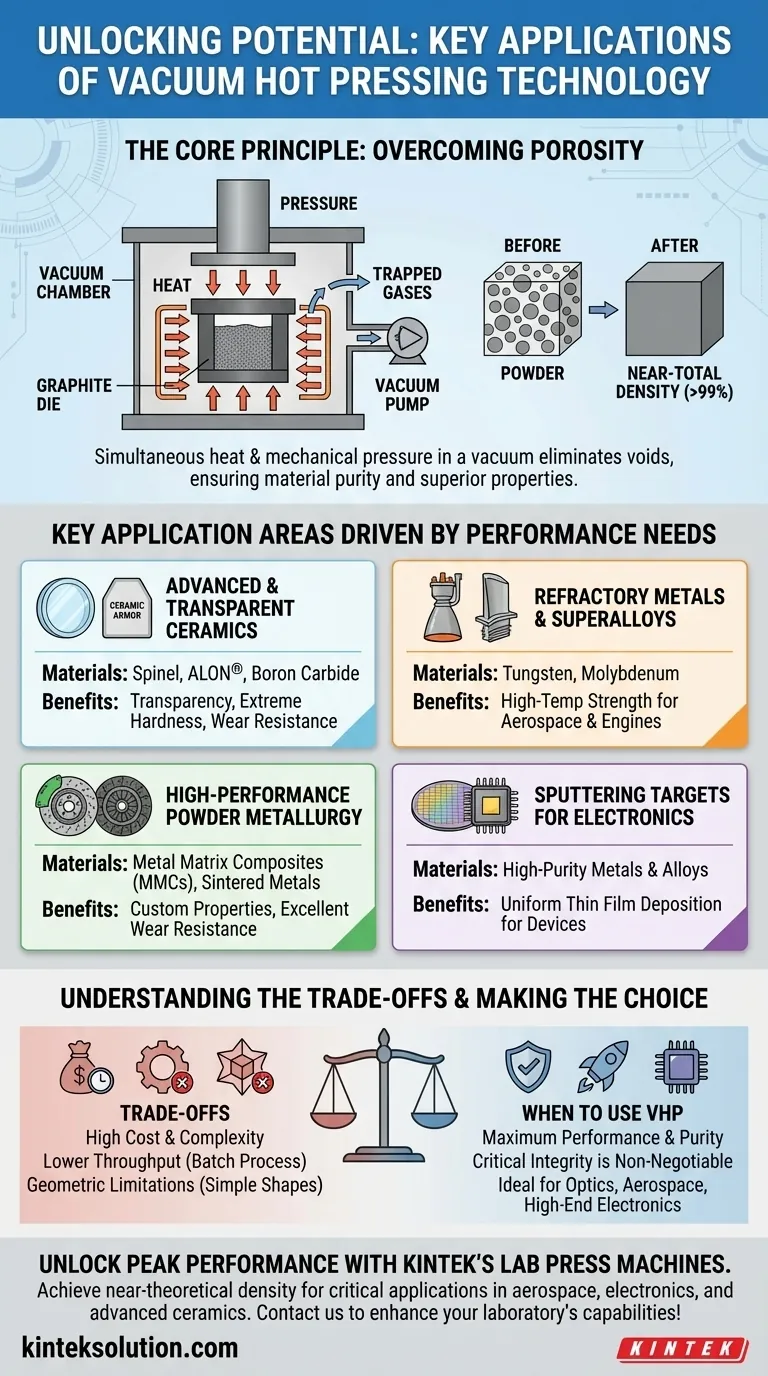
Related Products
- Heated Hydraulic Press Machine With Heated Plates For Vacuum Box Laboratory Hot Press
- Heated Hydraulic Press Machine with Heated Plates for Vacuum Box Laboratory Hot Press
- Automatic High Temperature Heated Hydraulic Press Machine with Heated Plates for Lab
- Automatic Heated Hydraulic Press Machine with Hot Plates for Laboratory
- Laboratory Manual Heated Hydraulic Press Machine with Hot Plates
People Also Ask
- How does using a hydraulic hot press at different temperatures affect the final microstructure of a PVDF film? Achieve Perfect Porosity or Density
- What are the industrial applications of a hydraulic heat press? Powering Lamination, Bonding, and R&D Efficiency
- What core conditions does a laboratory hydraulic press provide? Optimize Hot-Pressing for 3-Layer Particleboard
- What role does a heated hydraulic press play in powder compaction? Achieve Precise Material Control for Labs
- What critical conditions does a vacuum hot press (VHP) provide? Optimize Ultra-Fine Aluminum Powder Pre-Consolidation





